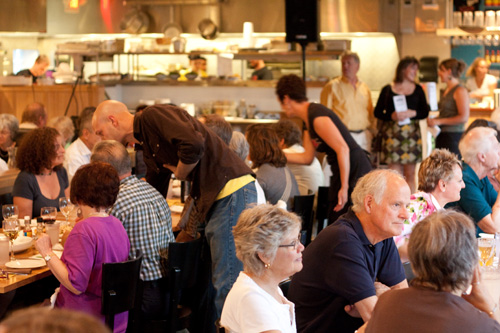As this blog’s primary purpose is to discuss issues related in some way or another to history, culture, colleges, and civil rights/injustices, I want to bring attention to another issue in this posting. One that receives far too little attention.
 This morning I had lunch at a busy restaurant. When we got to the table, the tip was still on the table, and I couldn’t help noticing the tip was only $2. As I desire to bring attention to issues of injustice, this posting will focus on restaurants and their workers.
This morning I had lunch at a busy restaurant. When we got to the table, the tip was still on the table, and I couldn’t help noticing the tip was only $2. As I desire to bring attention to issues of injustice, this posting will focus on restaurants and their workers.
When you eat at a restaurant, you really need to tip generously–whether or not the service was good. Servers make far below minimum wage (and even regular minimum wage is far too low). They make around $2 an hour. At most places, servers do not get to keep all of their tips. If the restaurant has a bar, a set percentage of the tip goes there. If the restaurant has a dedicated group of people who clean the table or bring chips when you first sit down, they get part of the tip. If your server is training someone, they get part of the tip, too. This money is directly withdrawn from the server’s check regardless of whether or not they sold alcohol, regardless of whether or not they cleaned their own tables, and regardless of the total tips they received or didn’t. In addition, some restaurants require all servers pool and divide their tips.
Furthermore, for tax purposes, it is frequently assumed you leave “x” percentage of tip depending on the restaurant and applicable laws, so your server loses even more when you don’t tip according to expectation.
I recommended tipping at least 15% always, preferably 20%. If the service is exceptional, add some. If you order an alcoholic beverage, add $2-3. If you take longer than most people take eating at that restaurant, add $4-5 per 30 minutes, especially if they are busy. If you are dining alone, always leave a minimum of $6-7. If you have quirky requests (see #8 in this list) like me, leave extra.
Those are the things I do – regardless of the service. If the service is good, I’m likely to leave 25-30% in gratuity, and I will be a repeat customer for that same restaurant and server.
Why? Because people in restaurants work hard. Part of the cost of eating out is the tip. People in restaurants are frequently asked (read: required) to work long, hard hours with little appreciation and little voice. Always remember that they have families and lives to live, too. They are saving money for college or for their kids or for something.
If the service is bad: ask to speak to a manager or write and tell them or just request not to have that person next time. Since I reside in “the middle of nowhere,” there are only four different restaurants that I eat at. At each of these places, I eat there when someone I know will be there, and I always request them (or make reservations with them), even if it requires waiting. This makes the dining experience much more enjoyable, and you know everything will be fine.
From all of my dear friends and students who work or have worked in restaurants, I know it is a tough world. When I first learned about the set amounts taken out of servers’ checks, I couldn’t believe such an unethical practice could continue. It never ceases to surprise me how often I’ll hear something like: “I had a table of 5 adults and 1 child, several special requests, they were at the table 90 minutes, and only left $3 for a ticket that was $100.”
It happens. Often. And this hurts your server.
If customers walk out without paying, the server has to pay the bill regardless, and it could cost them their job regardless. It happens more than you think. How is this fair at all?
Studies show that the richest people tend to be the worst tippers, and Sunday lunch eaters tend to be the second-worst tippers (the same people who tend to sit in church wondering why there aren’t more people and then go out-to-eat where a team waits on them and cooks for them). The working people tend to be the best.
Why do people in general leave tips that are too small? I don’t know. Some theories relate to all of the “tip jars” everywhere. Money is tight for the vast majority – really tight. In many other countries, tips are built into the price of the meal. Frequently people just don’t know; I didn’t until the last several years.
People working in restaurants have a difficult job. I couldn’t do it. They also have a very important job too – they are serving you and taking care of you while you eat. They work hard so you can have a nice leisurely meal.
If you eat out, please remember to always tip generously.

See also: This is our Democracy: Historical Perspectives and Contemporary Issues on Sexism and Racism
See also:
Please “follow” this blog if you are a WordPress user, and/or please sign up for email updates at the top right of the homepage. Thanks for reading. Check out my other articles, too. 🙂